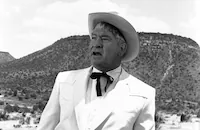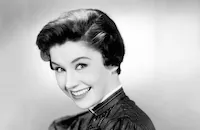The Wheeler Dealers

Brief Synopsis
Cast & Crew
Arthur Hiller
James Garner
Lee Remick
Phil Harris
Chill Wills
Louis Nye
Film Details
Technical Specs

Synopsis
"Wheeler-Dealer" Henry Tyroon comes to New York to raise more than a million dollars to finance a business scheme. He meets Molly Thatcher, a Wall Street stock analyst, whose boss, Bullard Bear, has assigned her to boost a stock (Universal Widget) that--though not to her knowledge--is apparently worthless. Molly's salary is an expense the firm can no longer afford, and they wish to be rid of her. Henry decides to help Molly with Universal Widget, maneuvering her boyfriend out of the way and dating her himself. Among the other side interests that Henry buys while in the city are a taxicab and driver, a chic restaurant, an art collection, and an abstract artist named Stanislas. In Massachusetts, Molly and Henry discover that Widgets went out of production in 1854, but they create an advertising campaign to promote the stock. They meet the Whipples, laconic New Englanders who own the hidden assets of Universal Widget, now a booming concern, and Henry strikes oil on Widget property. As Widget stock soars, a suspicious SEC investigates; and Henry, Molly, the Whipples, and assorted other characters are taken to court. Henry is revealed as a Yale man, not a Texan, and the Widget oil is discovered to stem from a pipeline. Molly, eased out of her job at this point, believes Henry responsible. A judge throws the confusing case out of court, ruling that the manipulation of Universal Widget is not against public interest. The Whipples own 48 percent, a group of Henry's Texas cronies own 48 percent, and Henry owns the controlling 4 percent of the stock. He sells his shares to the Whipples for the money he needs to support his business scheme, and he and Molly patch up their quarrel and decide to marry.

Director

Arthur Hiller
Cast

James Garner

Lee Remick

Phil Harris

Chill Wills

Louis Nye
John Astin

Jim Backus
Elliott Reid

Patricia Crowley
Pat Harrington Jr.
Joey Forman
Charles Watts

Vaughn Taylor
Howard Mcnear

Robert Strauss
Marcel Hillaire

John Marley
Don Briggs

Peter Leeds
William Fawcett
Percy Helton
Dal Mckennon
H. M. Wynant
Walter Burke
Crew
John Calley
George W. Davis
De Vol
Keogh Gleason
George J. W. Goodman
Henry Grace
Sydney Guilaroff
Charles K. Hagedon
Addison Hehr
Richard Kuhn
Charles Lang
Tom Mcadoo
Franklin Milton
Norman Norell
James S. Pollak
Martin Ransohoff
Martin Ransohoff
Randy Sparks
William Tuttle
Ivan Volkman
Ira Wallach
Al Westen

Videos
Movie Clip



Trailer
Hosted Intro
Film Details
Technical Specs

Articles
The Wheeler Dealers
James Garner, The Wheeler Dealers
James Garner brought the breezy good-old-boy persona that had made him a star on TV's Maverick to the big-screen with this 1963 comedy set in the wilds of Wall Street. He stars as a Texas millionaire (or is he?) out to double his fortune (if any) who gets bilked into buying bogus stocks (or are they?) by a pretty financial analyst (Lee Remick, whose beauty and charm are among the few things you can be sure of).
Garner had become a star when he managed to shift the Warner Bros. series Maverick from standard western to offbeat satire shortly after its 1957 debut. But when the studio took him off salary during a writers' strike - and refused to let him work anywhere else - he quit, leading to a lawsuit that successfully ended his contract. It also kept him pretty much out of work for two years. He returned to movies in 1962 with a straight dramatic role in The Children's Hour (1961), a film that performed poorly at the box-office despite the high-powered teaming of Audrey Hepburn and Shirley MacLaine. Then he had a comic success working with producer Martin Ransohoff and writer Ira Wallach on Boy's Night Out (1962). When Ransohoff picked up the rights to George J.W. Goodman's novel about Wall Street cowboys, it seemed the perfect way to bring the good-hearted con artist routine Garner had developed on television to the big screen. Released in the same year as three other hits - the World War II action adventure The Great Escape and the Doris Day comedies The Thrill of It All and Move Over, Darling - The Wheeler Dealers helped establish Garner as a major screen presence, kicking off a very successful decade on the big screen
The Wheeler Dealers marked a successful change of pace for leading lady Remick. Primarily a dramatic actress, she had just scored an Oscar® nomination as Jack Lemmon's alcoholic wife in Days of Wine and Roses (1962). That had followed a series of powerful dramas in which she played everything from the small-town vixen in Anatomy of a Murder (1959) to a simple farm woman in Wild River (1960). With The Wheeler Dealers, she proved that was equally adept at comedy, a genre she rarely got to play on the big screen, though she had appeared in numerous musicals during her days as a Broadway dancer.
Adding to the film's success was a supporting cast of versatile comic actors. Louis Nye and Pat Harrington, Jr. had both established themselves as members of the comic repertory company working on Steve Allen's TV show, while John Astin would soon play his most famous role, Gomez Addams, in Ransohoff's TV adaptation of The Addams Family. Also on hand were Patricia Crowley, star of the sitcom version of Please Don't Eat the Daisies (1965-67) and currently a regular on the ABC daytime drama Port Charles, and Jim Backus, just before embarking on a three-hour tour as Thurston Howell III on Gilligan's Island.
Producer: Martin Ransohoff
Director: Arthur Hiller
Screenplay: George J.W. Goodman, Ira Wallach, based on Goodman's novel
Cinematography: Charles Lang
Art Direction: George W. Davis, Addison Hehr
Music: Frank De Vol
Cast: James Garner (Henry Tyroon), Lee Remick (Molly Thatcher), Phil Harris (Ray Jay), Chill Wills (Jay Ray), Louis Nye (Stanislas), John Astin (Hector Vanson), Jim Backus (Bullard Bear), Patricia Crowley (Eloise), Pat Harrington, Jr. (Buddy Zack), Howard McNear (Mr. Wilson).
C-106m. Letterboxed.
by Frank Miller

The Wheeler Dealers
Louis Nye (1913-2005)
Nye was born on May 1, 1913, in Hartford, Connecticut to Russian immigrants. He began his career in theater in his native Hartford before moving to New York City to break into radio. After a stint in the Army during World War II, Nye returned to find a new medium dawning, television. His start was inauspicious, just a few appearances on the Cavalcade of Stars, but little did he realize that when he was picked up for The Steve Allen Show in 1956 that he, along with other talented comedians like Don Knotts, Tom Poston and Bill Dana, were courting stardom. The program was one of the first sketch series to take off on television. It was justly celebrated for the wacky characterizations that the cast invented, and Nye's Gordon Hathaway was no exception. Sure, his take on the country club elite was a touch prissy and effete, but Nye injected Gordon with a raffish charm and child-like sensibilty that never made the character offensive. If anything, Gordon Hathaway was endearing.
His stint on Steve Allen opened up the movie offers, the first of which, the garish Mamie Van Doren vehicle Sex Kittens Go to College (1960), was not exactly a highpoint in cinema comedy, but he soon settled into some good supporting parts in a slew of films: The Facts of Life (1960), The Last Time I Saw Archie (his best film role, a terrrific comic foil for Robert Mitchum, 1961), The Wheeler Dealers, Who's Been Sleeping in My Bed? (both 1963), Good Neighbor Sam (another great part as an inept detective, 1964), and A Guide for the Married Man (1967).
Nye's career cooled in the '70s, with an occasional television appearance (Laverne & Shirley, Fantasy Island) and mediocre flicks (Won Ton Ton, the Dog Who Saved Hollywood (1976), Harper Valley P.T.A. (1978). Eventually, he found solace in voice work for many animated shows, the most popular of them being his long run on Inspector Gadget (1985-99). Still, just when you thought he was out of the limelight, he returned as a semi-regular in the critically acclaimed HBO comedy Curb Your Enthusiasm where for two seasons (2000-2002), he was hilarious as comic Jeff Garlin's sardonic father. Give Mr. Nye his due, he left the stage near the top of his game. He is survived by his wife, Anita; and a son, Peter.
by Michael T. Toole
Louis Nye (1913-2005)
Quotes
You don't go wheelin' 'n' dealin' for money. You do it for fun. Money's just the way you keep score.- Henry Tyroon
Trivia
Miscellaneous Notes
Released in United States 1963
Released in United States 1963















